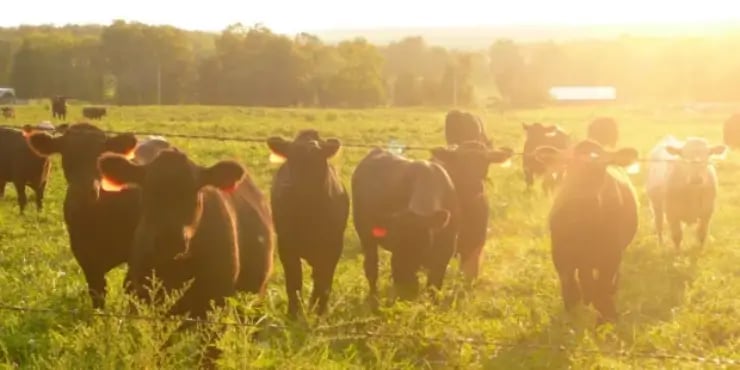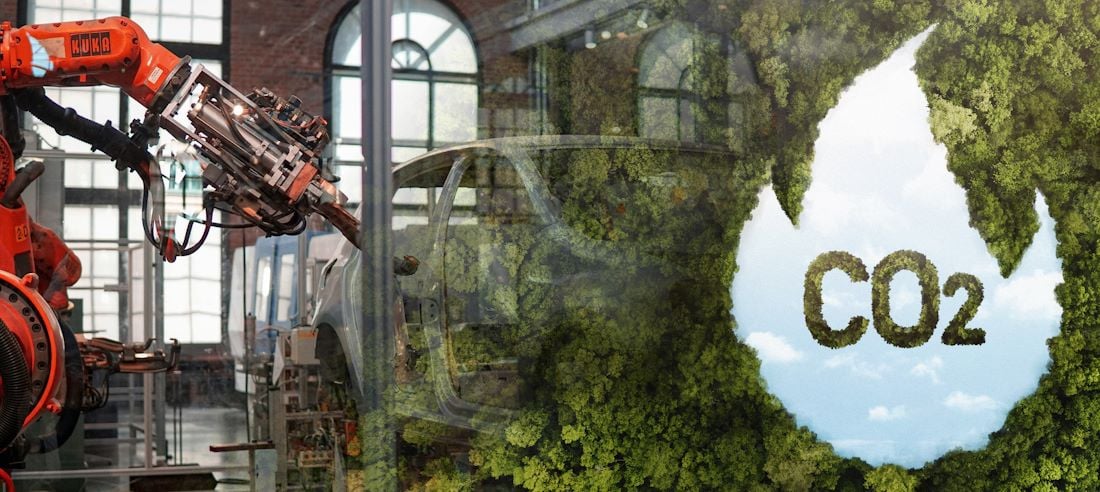Right after driving, flying, heating, and cooling, consuming meat and dairy products weighs the most heavily on our lifestyle related climate budget. While it is clear that fossil fuel powered cars, airplanes, heaters and air conditioners have a terrible carbon footprint, what’s the deal with cows, really? Is dairy all that bad? Assuming this to be the case, what options are there to replace them? How do soy milk and other alternatives score in their overall environmental impacts compared to traditional milk? In this article, we’ll analyze the life cycle of milk and relate it to soy milk, and we’ll discover some surprising pros and cons of dairy-based foods in comparison to the alternatives.
Cows need water, fodder, space to live, and space to cultivate the fodder. Their feed consists of grass, hay and silage, often supplemented by a protein-rich mix of corn or soy, especially on high-output-oriented conventional farms. But the way you produce the fodder changes the impact of the final dairy product. Organic milk has a slightly different global warming potential than conventional milk and requires less fossil energy (10 instead of 14 calories of fossil energy needed for each calorie in the milk, see PDF here). However, even treating cows with all the respect that organic labels require, can’t stop them from farting. In order to build up their desired outputs – milk and meat proteins – cows produce two unwanted byproducts. To make the food accessible to their body, all four of a cow’s stomachs break down fiber to digest carbon molecules and other nutritional elements that the fodder contains. Cows ferment the fodder using the unique chemical environments in their digestive tract. While doing so, they also produce methane, a greenhouse gas 23-times more powerful than carbon dioxide. Cow fart by cow fart, livestock farming is a collection of tiny disasters for the atmosphere.
It is this methane that receives the most criticism when it comes to our habit of consuming beef and milk. But there’s more. The other unwanted byproduct is manure – simply put, shit – and this, when washed out of pastures, stables and cropland, causes water ecosystem eutrophication, as in nutrient overflow, as well as both soil and water acidification, plus nitrate pollution. These are impacts of farming, no matter what you grow. As soon as you use fertilizer, you run the risk of your nutrients ending up in the surrounding water instead of in their dedicated destination, be that a crop or a cow’s body. So, for the cultivation of most plants that are used to replace cow milk, for instance soy or rice, the same environmental impact categories are affected. But to a much lesser extent.
In terms of numbers, the comparison is mind-blowing. A Danish life cycle assessment found that one liter of Danish milk needs slightly less fossil energy than does producing soy beans and shipping them around the globe to provide the Danish consumer with a liter of soy-milk (3.25 vs. 3.57 MJ fossil energy, see PDF here). According to a different LCA, Swiss milk requires almost 5 MJ of fossil energy per kg (see PDF, in German). Although the have almost equal energy requirements, the Danish study found stunning disadvantages for milk, namely that it accounts for three times the global warming potential (900 g vs. 329 g CO2-eq) and causes almost 400 times the eutrophication of soy milk (39 g vs. 0.119 g NO3-eq)! A third study, an American LCA conducted by a coconut milk producer (PDF here) supports the Danish result for the fossil energy need of soy milk (3.6 MJ). When you seek even more energy-efficient ways to soak your cereals than going soy, you might try coconut milk with 1.9 MJ or almond milk with only 1.4 MJ fossil energy consumption (see PDF p. 20). I couldn’t find any figures for oat milk, but with a 3000-year-old tradition of cultivation, oats are well adapted to many climates, require the least pesticides, and can be efficiently grown locally or regionally almost anywhere in the Western world. Which leads us to a point that is hard to measure: from a truly holistic viewpoint, supporting a local, small-scale milk industry that cultivates its own fodder could be more sustainable than going to a supermarket to buy packages of imported, multinational food corporation soy that’s been converted to an ersatz milk.
Since milk production has different impacts in different places, it is important to know the local conditions in order to make a suitable comparison. There are mountainous regions in countries like Austria and Switzerland with a centuries-old tradition of extensive livestock farming. Rough conditions and inaccessible terrain aren’t well suited for crop cultivation and in many high-altitude summer pastures the biodiversity exceeds that of the surrounding forests. An Austro-Swiss LCA (PDF here, in German) found organic milk from the mountains to have a 14% lower carbon footprint and a 15% lower water footprint than conventional milk, although each kg organic milk still used 1m³ of water and emitted more than 1kg CO2-eq. Pastures provide an important ecosystem for insects, plants, birds and mammals which would otherwise become extinct, especially in the mountains. Today, it is the cows that keep pastures low and prevent forests from spreading. A long time ago, this task used to be done by free herds of grazing megaherbivores, buffalo for instance. But with the spread of humans, they have disappeared, and so would the grasslands if it weren’t for the cows. So in the context of a forest-covered, developed country with a long tradition both in sustainable forestry and in sustainable agriculture, milk has a special position. There is no land use competition. The pastures are there, and have been for the longest time. The farms are small, the cows free, and the economic cycles local. That’s how organic milk allows for a 25% higher biodiversity than conventional milk (same LCA result ). Although I couldn’t find a biodiversity assessment for organic soy production, in this situation, soy milk seems ridiculous, especially if made using conventional, genetically modified soy beans shipped around the globe and cultivated in a way that threatens rainforests.
As ever so often, the state of affairs in one place is completely different from another. No wonder that different LCAs come to different conclusions, despite consistency in method. What data source the life cycle assessment is based on strongly affects its result. For many emerging economies, there might be a tradition in soy or rice farming. They would have to either import milk and dairy products from overseas or destroy native ecosystems to make room for pastures or feeding crops. For Argentina or China, milk alternatives win a hundred fights over dairy milk.
Anyway, it is clear that organic is better than conventional, that local out powers imported, and that plant-based is way more efficient and water-friendly than animal-based. All of the above thoughts have focused on the production phase. But even in the distribution and the use phase, plant-based drinks have giant advantages: they need no cooling and last at least a year, thereby saving energy for refrigeration and reducing food waste. So, how would it be if we had a soy milk Monday, almond Tuesday, coconut Wednesday, rice milk Thursday, oat milk Friday, and just spared the dairy for the weekend, provided we find a local and organic source of it?
Article image CC BY SA 2.0 by StevenW.





